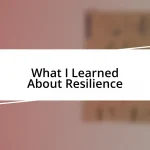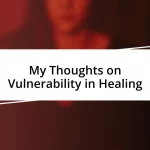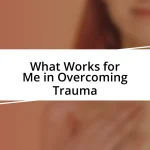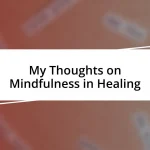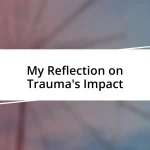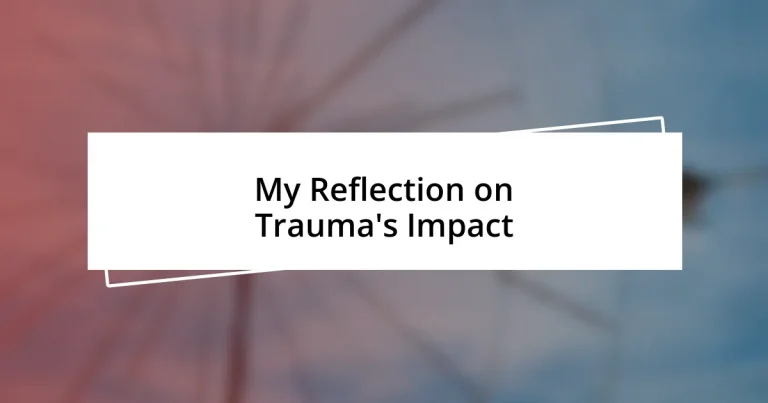Key takeaways:
- Understanding trauma’s lingering effects is crucial for navigating emotions and relationships.
- Recognizing trauma symptoms, both physical and emotional, empowers individuals to seek support and healing.
- Utilizing coping mechanisms like creative expression, mindfulness, and support systems aids in recovery and personal growth.
- Vulnerability and setting boundaries are essential for fostering deeper connections and prioritizing well-being during the healing journey.
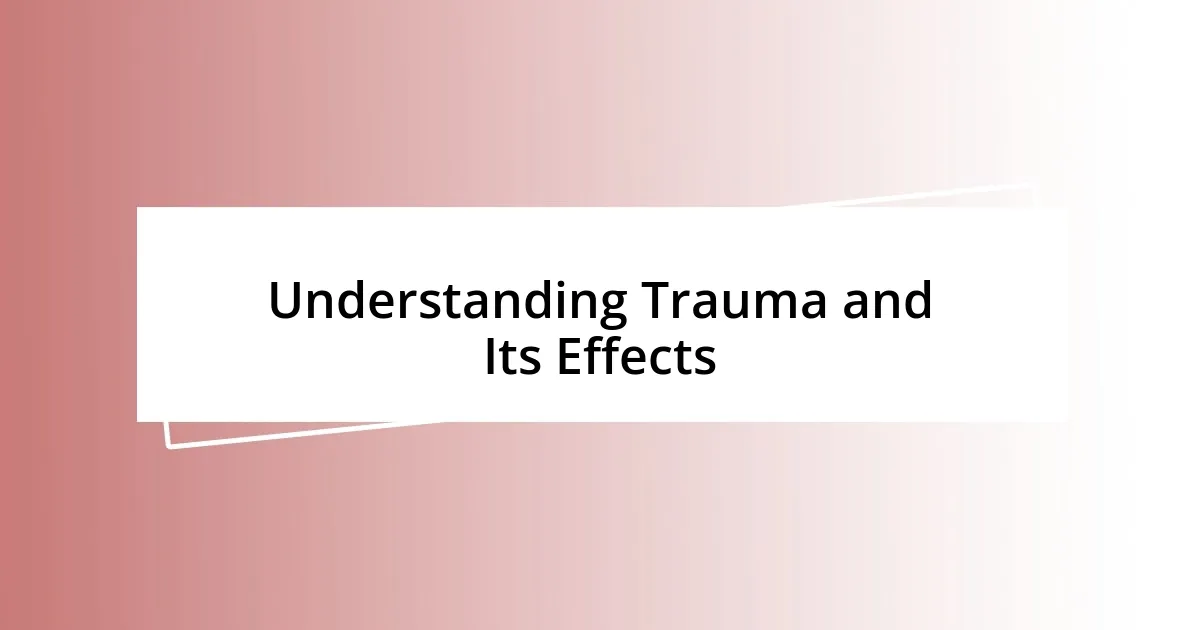
Understanding Trauma and Its Effects
Understanding trauma is essential because it profoundly affects how we navigate the world. I remember a time when a seemingly minor incident—a loud bang during a casual outing—triggered a wave of anxiety within me. It was a reminder of how deeply past experiences can resurface in unexpected moments, leaving us feeling vulnerable and unsettled.
Trauma doesn’t simply vanish; it lingers like a shadow, influencing our thoughts and emotions. I often find myself reflecting on how a single traumatic event can reshape one’s identity. Have you ever noticed how, after a difficult experience, you may view relationships differently or feel on edge in unfamiliar situations? It highlights just how interconnected our past traumas are with our present selves.
The emotional effects are multifaceted, often causing complications in our daily lives. I’ve spoken to friends who describe feeling numb or disconnected after witnessing a traumatic event, emphasizing how trauma can dull our ability to experience joy. It’s intriguing to consider: how does something that happened long ago continue to color our perceptions and reactions today? Understanding this connection is crucial for healing and moving forward.
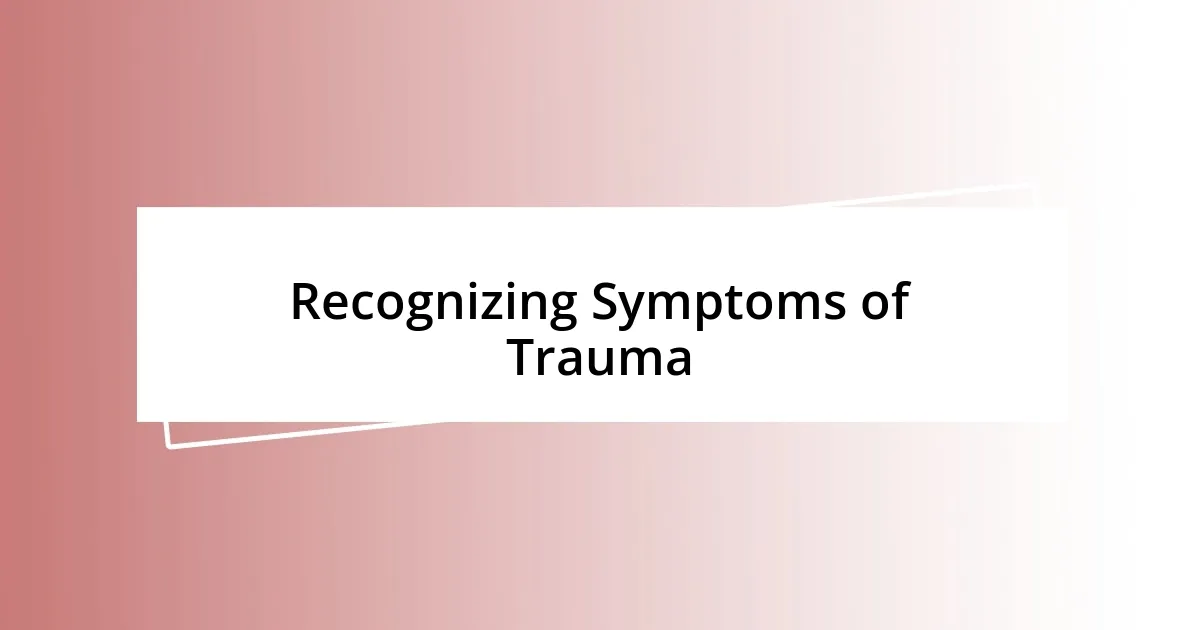
Recognizing Symptoms of Trauma
Recognizing the symptoms of trauma is a crucial step toward healing. From my own experience, I’ve seen how subtle signs can manifest in unexpected ways. For instance, after a stressful life event, I noticed heightened sensitivity to loud noises, which at first felt trivial—until I realized it took me back to a place I didn’t want to revisit. These reactions can often mimic anxiety or depression, making it essential to identify them early on.
In addition to physical symptoms, emotional responses play a significant role in recognizing trauma. I remember grappling with overwhelming feelings of sadness that seemed to come out of nowhere, much like waves crashing on a calm beach. I learned that irritability, mood swings, and a sense of isolation can signal unresolved trauma. The emotional rollercoaster can be confusing; however, understanding these signals empowers us to seek support.
Lastly, it’s interesting how trauma can affect our relationships with others. I’ve experienced times when I would withdraw from friends, fearing their judgments about my feelings. This sense of disconnection showed me that recognizing these patterns is vital for nurturing healthy connections. Understanding these symptoms helps us not only reflect on our experiences but also foster deeper connections with those around us.
| Physical Symptoms | Emotional Symptoms |
|---|---|
| Heightened sensitivity to stimuli | Intense feelings of sadness |
| Frequent headaches or fatigue | Irritability and mood swings |
| Difficulty sleeping | Social withdrawal |
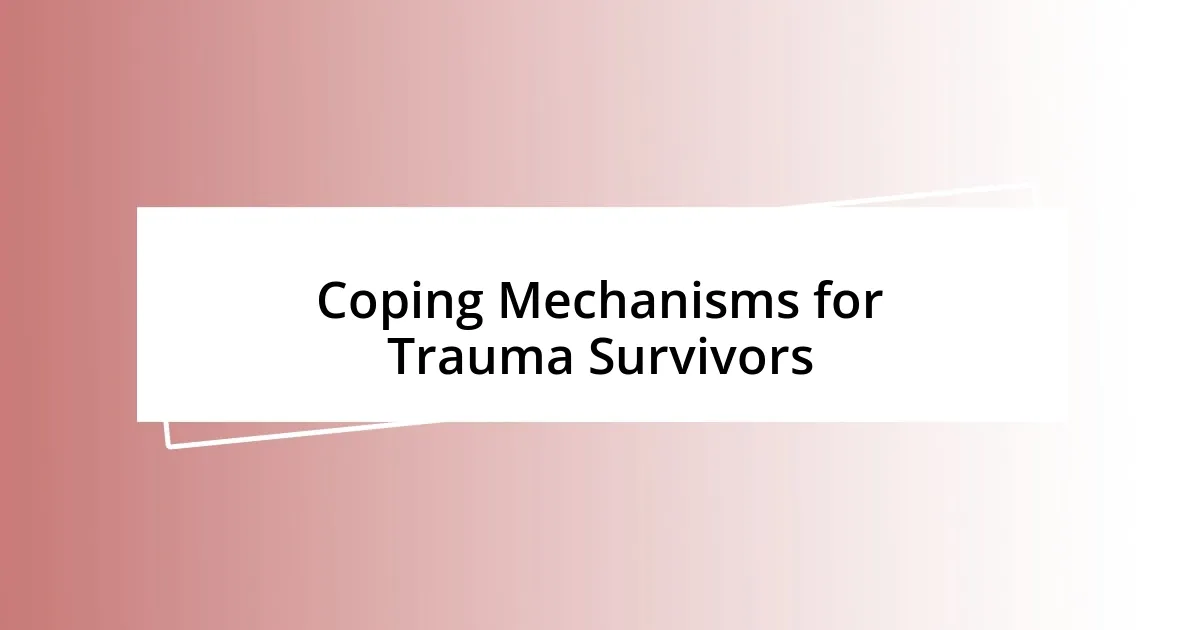
Coping Mechanisms for Trauma Survivors
Coping with trauma can be a deeply personal journey, and it often involves a mix of strategies that vary from person to person. In my own experience, I’ve found that engaging in creative outlets, like writing or painting, provides an emotional release. It’s almost therapeutic; when I channel my pain into art, I feel a sense of control and understanding over my feelings that often seems elusive in everyday life. Another method I’ve turned to is mindfulness meditation. I remember the first time I tried it; sitting quietly in a room, I felt an overwhelming wave of emotions surface. Rather than pushing them away, I let them flow. This practice helped me to acknowledge my feelings without judgment, creating a space for healing.
Here are some effective coping mechanisms for trauma survivors:
– Creative Expression: Engaging in art, music, or writing to process emotions.
– Mindfulness and Meditation: Practicing being present helps in managing anxiety and reconnecting with oneself.
– Physical Exercise: Activities like yoga or running can relieve stress and improve mood.
– Building Support Networks: Staying connected with friends or support groups can foster a sense of belonging.
– Professional Therapy: Speaking with a counselor or therapist helps in processing trauma’s impact deeply and safely.
Exploring various coping mechanisms can truly transform how we deal with trauma. I recall having a particularly tough week where everything felt heavy; I decided to indulge in nature by taking long walks in the park. Being surrounded by trees and the sounds of chirping birds gave me clarity. It reminded me that, like nature, it’s essential to allow myself to grow and heal, even when it feels uncomfortable. Additionally, I discovered that journaling not only helps in tracking progress but also acts as a mirror for my thoughts. On bad days, writing became my companion, guiding me through the storm of emotions.
Effective coping approaches include:
– Nature Therapy: Spending time outdoors can ground and uplift your spirit.
– Journaling: Documenting feelings and experiences aids in processing and reflection.
– Routine Building: Establishing daily routines can create a sense of normalcy and stability.
– Healthy Eating: Nourishing your body can significantly impact mood and energy levels.
– Seeking New Skills or Hobbies: Learning something new can boost confidence and provide distraction.
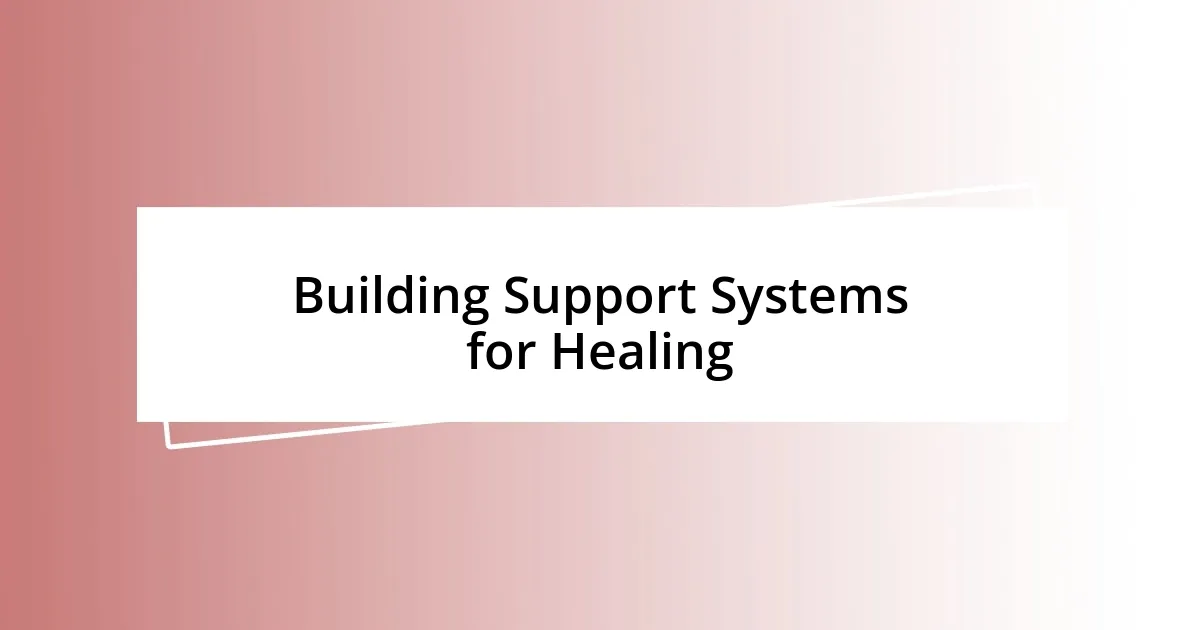
Building Support Systems for Healing
Building a strong support system is vital for healing from trauma. I remember a time when I was feeling isolated, convinced that nobody could relate to my struggles. It was a friend’s gentle reach-out that reminded me how crucial it is to have people around who understand, or at least listen. This experience underscored the importance of surrounding ourselves with empathetic individuals who can offer comfort without judgment—sometimes, just having someone to share silence with can be immensely healing.
In my journey, I’ve learned that support systems can take many forms. Consider joining a local support group or finding an online community where others share similar experiences. It’s remarkable how connecting with those who’ve walked similar paths can foster a sense of belonging that’s often missing after trauma. I distinctly recall meeting people at a workshop who illuminated my own feelings and struggles, helping me realize I was not alone. This connection can fortify the healing process and inspire resilience.
Additionally, fostering relationships requires vulnerability, which can be daunting but ultimately rewarding. I often ask myself, “How do I express what I need?” Sharing our journeys with trusted friends or therapists can pave the way for deeper connections and a better understanding of ourselves. It’s all about creating a nurturing space where we can openly share our feelings, guiding us toward healing together. In my experience, every small step towards openness builds a stronger foundation for recovery.
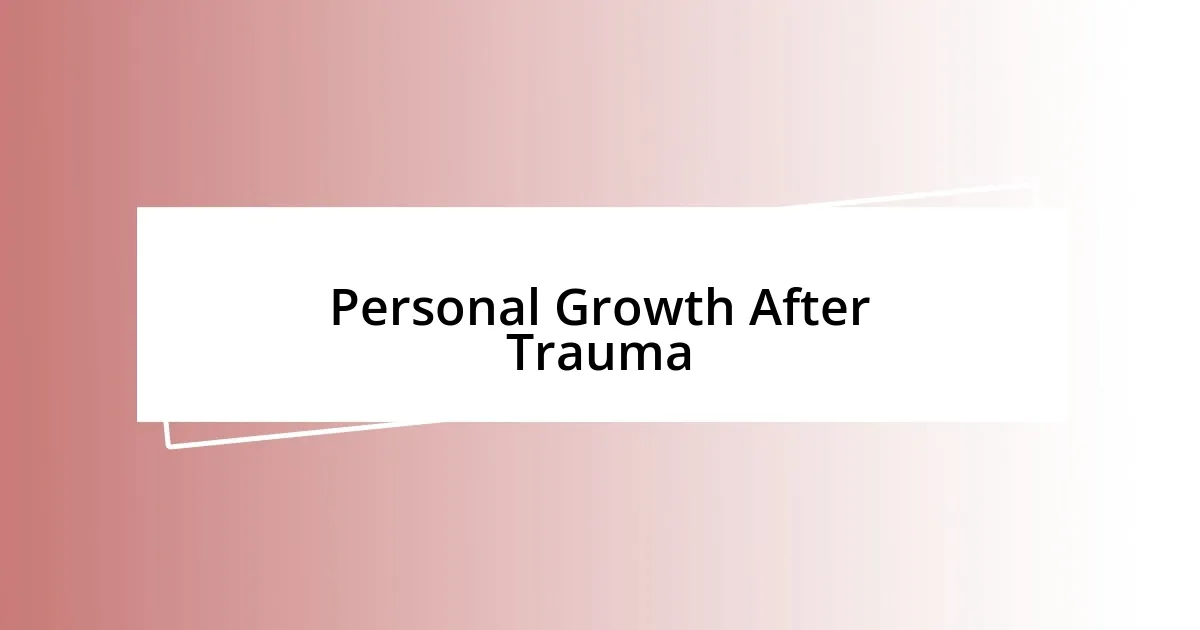
Personal Growth After Trauma
Personal growth after experiencing trauma can feel like a daunting journey, but it often leads to unexpected insights. I vividly recall a moment of clarity during a day when everything felt overwhelming. Instead of retreating into my shell, I chose to take a leap of faith and sign up for a public speaking course. That decision transformed not only how I communicated but also how I viewed myself. I began to see my voice as a powerful tool rather than a reminder of my fears. Isn’t it fascinating how stepping out of our comfort zones can propel us into new realms of personal strength?
As I continued to navigate my healing journey, I discovered the importance of setting boundaries. Initially, I felt guilty about saying no to things and people that drained my energy. However, I learned that prioritizing my well-being was not selfish; it was essential. Establishing clear boundaries allowed me to create space for activities that nurtured my spirit. Have you ever felt the weight lift when you finally said no to something that wasn’t serving you? It was liberating for me, opening up avenues for growth that I didn’t even know I needed.
The path of personal growth after trauma is often paved with self-discovery. I remember an afternoon where I poured my heart into a letter, not meant for anyone but myself. Writing it laid bare my pain but, more importantly, revealed my hopes. In those moments of vulnerability, I realized that acknowledging my feelings didn’t diminish my strength; it magnified it. Isn’t it empowering to recognize that our scars can be the roadmap to our resilience? Through reflection and acceptance, I began to understand that personal transformation often emerges in the quiet aftermath of hardship.
